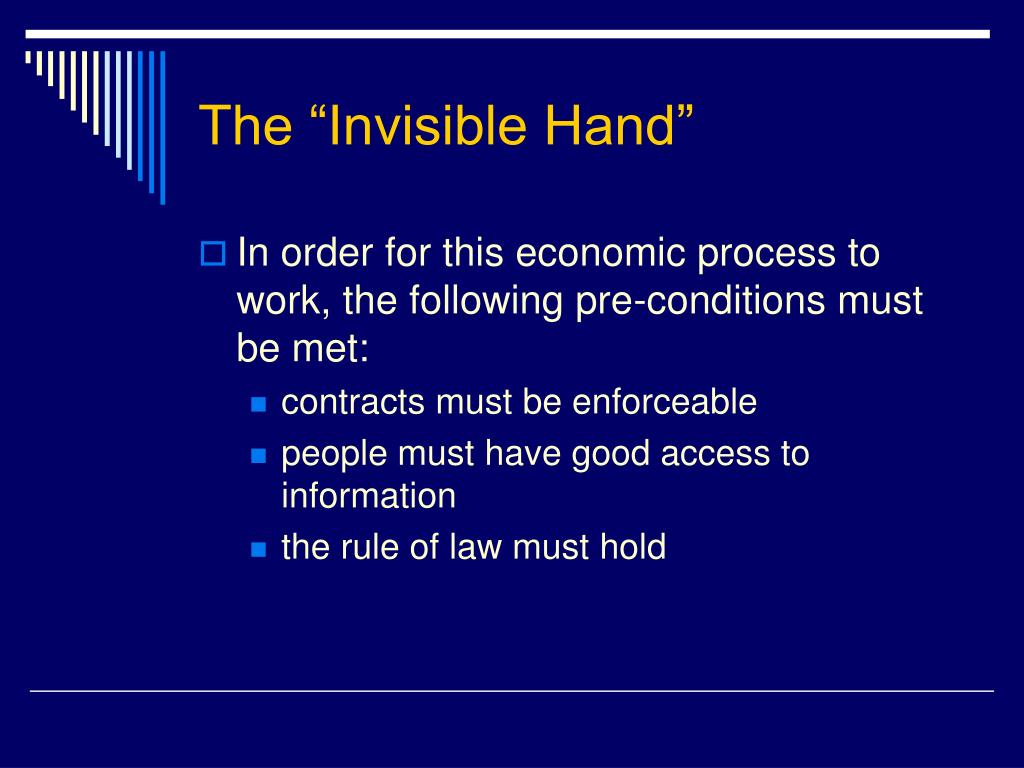

In general, the ‘invisible hand’ can apply to any individual action that has unintended and/or unplanned consequences, particularly those that arise from actions not organized or orchestrated by a central command, and that have an evident, patterned effect on society.

Protectionism is a policy some governments adopt to reduce imports by imposing tariffs, quotas and other barriers. Smith used the metaphor in context of an argument criticizing government regulation of markets and protectionism. Investors invest in those businesses that provide the best returns, and remove their capital from those that are less efficient in creating value.Īll these effects – efficient production, low prices, growth of successful businesses that make lots of things we want – occur dynamically and automatically. Producers’ desire to gain market share are achieved by offering the lowest prices possible. Producers’ desire to maximize profits leads to efficient methods of production. Self-interest drives the players to beneficial behavior in a case of serendipity (fortunate coincidence).
#INVISIBLE HAND DEFINITION ECONOMICS FREE#
According to Adam Smith, by definition the invisible hand is an observable market force that helps the demand and supply of goods and services in a free market economy reach a balance automatically.
#INVISIBLE HAND DEFINITION ECONOMICS HOW TO#
Smith’s interpretation, if each consumer is allowed to choose freely what to purchase, and each supplier or producer is allowed to choose freely what to sell and how to make it, the market will settle on the best possible balance of product distribution and prices, which benefits society as a whole. Smith’s interpretation of the invisible hand He used the term as a metaphor for how, in a market that is allowed to function freely, basically selfish people operate through a system of mutual interdependence, which overall benefits society. Smith did not believe there was a real invisible hand. antitrust legislation, the enforcement of property rights, and to provide national defense and policing. Examples he included of government action were laws to protect consumers from monopolistic behaviors, i.e. He also recognized that this invisible hand was not flawless, and that sometimes government action was required. Smith explained that it was as if an invisible hand guided the actions of individual people to combine for the common good. However, the ‘invisible hand’ has come to capture his fundamental belief that society benefits more by individual people’s self-interested actions than actions that are intended to directly benefit society. Smith only used the term three times in his writings. makes the following comment regarding the invisible hand: “Its positive aspect is that if everyone in a society seeks economic self interest (in an environment of free and open competition) then, as if prodded by an invisible hand, he or she (unknowingly and unintentionally) will also be serving the larger interest of the society as a whole.” Smith, who is known today as the ‘father of modern economics’, used ‘the invisible hand’ with respect to income distribution in 1759 and production in 1776 in his papers The Theory of Moral Sentiments and An Inquiry into the Nature and Causes of the Wealth of Nations respectively. Smith’s ‘invisible hand’ described how individuals making selfish decisions could collectively and unwittingly contribute to an effective economic system that was in the public interest. If we all act from self-interest, motivated by profit, then the economy will function more efficiently and productively, than it would if economic activity were directed by some kind of central planner. The term refers to the free market’s ability to allocate factors of production, products and services to their most valuable use. The invisible hand is a term that Scottish moral philosopher and political economist Adam Smith (1723-1790) used to describe the unintended social benefits of individual actions.


 0 kommentar(er)
0 kommentar(er)
